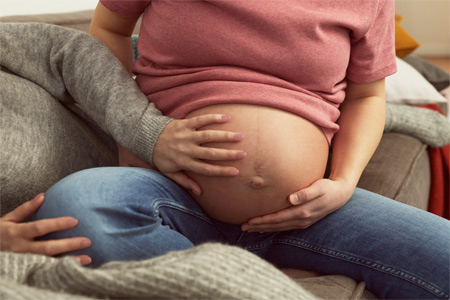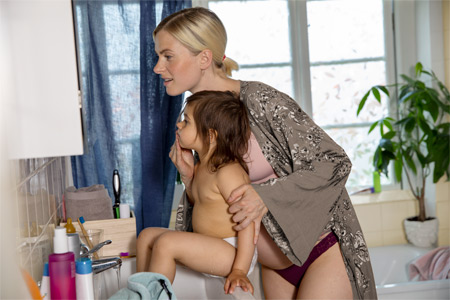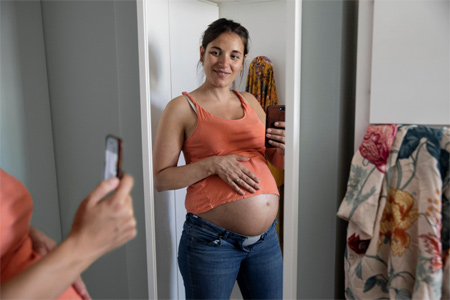Foetal movements - how often should the baby move?
Maybe it feels like the gentle flutter of butterfly wings – or maybe it feels like you’ve got a budding gymnast in your belly. All babies are different, and so is how they move while in the womb. But sooner or later, you will feel the little bun in your belly move around.
Maybe you feel like you’ve been waiting forever for that first kick, especially if this is your first pregnancy and you’re not quite sure what to look for. Sometimes it can feel like fluttering butterfly wings; sometimes it might feel like your gut is unusually active – it can also be hard to really absorb the feeling and firmly grasp that there’s a baby in there, striving to make itself known. There is no particular week when you will start feeling your baby move; rather, it’s highly individual and depends on you, and on what your baby is like. If this is your first baby, you might not feel those first foetal movements until week 20 or later. At first, your baby may announce their presence through movement anywhere from every few hours to every few days.
Placenta position might determine when you feel foetal movements
If the placenta is positioned along the front wall of the uterus, it might be a little later before you feel the baby move, because a large organ is in the way, preventing you from feeling those kicks early on. The routine ultrasound carried out around week 18 will show the position of the placenta.
Tips for feeling foetal movements
So, what exactly should you be looking for? And can you get the baby to start moving, so that you can feel a little kick or two? Not really. Already in your belly, your baby has their own little personality – some will start moving earlier, others later. But it might be easier to feel the baby move if you lie on your side. And of course, the more the baby grows, the more apparent the movements will be from the outside.
If you think it’s exciting to feel how the baby moves, you might enjoy exploring something called mindfetalness, which involves learning to focus on the foetal movements and getting to know your baby’s movement pattern. Apart from offering a natural moment of closeness and a way to connect, it can also reduce anxiety: when you know how your baby tends to move, you might feel more secure. Talk to your doctor or midwife to learn more about this method.
You can feel when the baby is asleep or awake
The movements change during pregnancy. At first, they’ll be quite subtle and irregular, and later, they’ll become stronger and follow a clear pattern. The baby’s rhythm will become clearer and you will start to sense when they’re resting versus active. Naturally, it’s soothing when the baby moves around a lot – because then you know they’re doing well – but they need calmer periods, too. From week 24, we generally say that you should feel the baby move at some point every day. If you are not feeling the baby move, for example if they’re suddenly calmer than usual, then talk to your doctor or midwife.
Many babies seem to be lulled to sleep when the body housing them is in motion – which means they might wake up when you are still or resting for a while. This might explain why so many pregnant people feel like their baby is more active at night, which can make it harder to fall asleep. Others feel like a circus is underway in their belly early in the morning instead.. Simply put, there can be a massive difference from one baby to the next when it comes to how much, how often, what times and how powerfully they kick. With time, you’ll learn to recognise your baby’s movement patterns.
Things get crowded towards the end
The baby is growing inside the womb and gradually, things get a little too cramped for bigger movements. Late in your pregnancy, you may notice that the baby’s movements feel different. It might feel like they’re stretching out more, and pushing your belly up, down, and to the side. When a little foot appears pressed up against your belly, you can try pressing a little ‘hello’ in response – you might get an answer in return. If you aren’t quite sure what’s a foot and what’s a hand, you can ask your midwife for help recognising the baby’s various body parts – it can be nice to know whether you’re patting a head or a bottom. In any case, the baby seems to be fully aware that there’s a whole world out there, with people who can’t wait to meet them.
Always contact your doctor, midwife, or clinic if you are worried
If you notice a change in your baby’s movement patterns, especially if they are moving noticeably less, you should always contact your clinic for advice. Your doctor or midwife will give you tips on how to get the baby to be a little more active, or ask you to come in for a checkup. In the latter case, they will do a CTG scan and possibly an ultrasound. Trust your instincts and always get in touch with your doctor, midwife, or clinic if you are uncertain.
Please note that all information above is based on Swedish recommendations.


